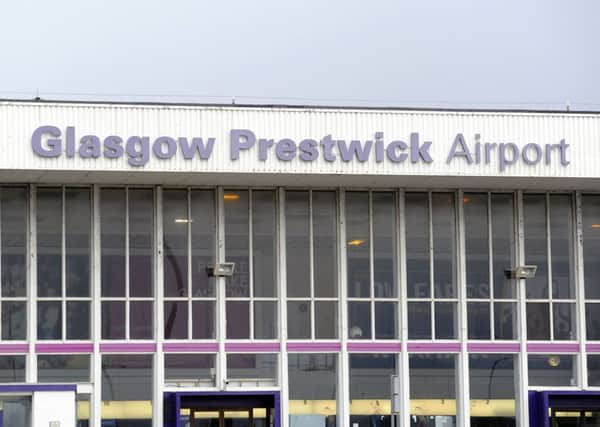Leaders: Prestwick Airport past point of no return


But it also the view of the directors of the airport that it will be difficult to grow income from passenger volume – the biggest driver of revenue. In fact they went further and warned it would suffer further in the next financial year as the effects of Ryanair’s decision to transfer some of its operations from Prestwick to its new Glasgow Airport hub is felt.
Now considerations like that are all part and parcel of running a business. People, usually very experienced, very knowledgeable people, make decisions about what they believe to be best for the company and if they are generally right the business makes money, and if they are wrong then the business loses money, and the owners of the business are the ones who take that risk.
Advertisement
Hide AdAdvertisement
Hide AdBut the difficulty with Prestwick Airport is that the owner of that business is the Scottish Government, which has the money given to it by taxpayers. Taxpayers are not the people who should be having their money risked in a business. The airport was bought by the Scottish Government in 2013 for just £1 after owners Infratil failed to find a commercial buyer.
And now we find out that losses almost doubled last year, rising to £8.9 million in the year to March compared with £4.6m in the previous year. It is estimated that the government will have to lend the airport up to £40m by 2020-21.
One of the potential changes that might help Prestwick is a drop in Air Passenger Duty. Now it just so happens that the setting of that tax is due to be devolved to Holyrood, so one can imagine how that will go. But it seems very unlikely if that in itself will provide a turnaround in Prestwick’s fortunes.
Now the Scottish Government has always said that it understands there are no quick fixes for Prestwick and that it is in it for the long term. What that means is the present government has potentially lumbered any successive governments with a long-term drain on their resources.
Probably most telling though was the government spokesman saying the figures were not surprising but, “there are real opportunities to improve in all areas of the business”.
It is not the government’s business to run airports. There are many people who understand airports who decided there was no economic way for this business to continue and who decided against getting involved and putting their money in.
Instead the taxpayer was given no choice about whether or not to put millions of pounds in and be committed to this project for years with any eventual return uncertain.
PM needs to do more to beat IS
Islamic State is a poison and there does have to be action taken against it. That action needs to be on a number of fronts, including military strikes against the organisation in both Iraq and Syria. But Prime Minister David Cameron is right also to act to try to make Britain a more integrated society and a safer democracy.
Advertisement
Hide AdAdvertisement
Hide AdHis government is expected to set out a wider counter-extremism strategy later this year which will include more legislation. It is to be hoped that strategy will be a lot stronger and more precise than the one he unveiled yesterday, which was staggeringly underwhelming.
His heart is in the right place, and acting to prevent radicalisation will be a long haul and will never be 100 per cent effective. The fact is that young people like to rebel. But there have to be serious questions about just how effective the measures proposed by Mr Cameron yesterday are going to be.
He wants Ofcom to clamp down on foreign TV channels broadcasting extremist messages but surely, given the internet, that must amount to a tiny percentage of the fundamentalist material available.
But it’s OK, Mr Cameron has also thought of the internet. The government is going to demand that internet service providers do more to remove extremist material and identify those responsible for it. We can see from the complete and utter failure of that tactic in eradicating child pornography what we can expect to happen to those fundamentalist websites.
The truth is that the measures outlined by Mr Cameron yesterday would seem unlikely to make any significant difference.